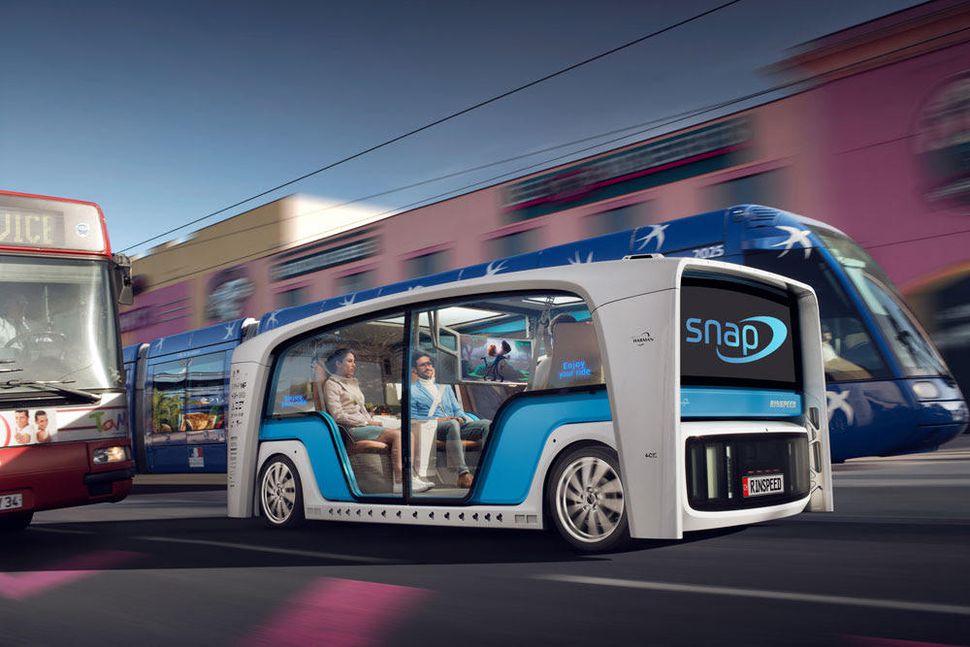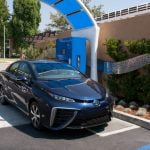![]()
Rinspeed’s Snap concept demonstrates how future cars might separate the chassis and passenger compartment.
As CES 2018 fast approaches, it brings with it the future of cars. As in recent years, automakers and equipment suppliers will show off the latest innovations, most of which will go into production cars in the next few years.
Self-driving cars, the next big innovation for automotive, will have a big presence at the show as well. Not only will companies give demos of prototypes, but some of the biggest names in electronics are beginning to address the issue of how passengers will spend their time in the cars of the future.
Concepts, electrics and robots
No company is more ready to take the plunge into the automotive future than Rinspeed and its partner, Harman International. At CES 2018, Rinspeed will be showing off its Snap concept car in the Harman showcase at the Hard Rock Hotel in Las Vegas. One key concept of Snap is how it separates the chassis and and cabin, making for a flexible transportation system. If you need to carry a few passengers, there’s a cabin for that, or if you need to sell ice cream, there could be a utility cabin for that.
As with previous Rinspeed concepts, Snap will serve as a showcase for technologies from partner such as Harman.

Byton
A new player on the electric vehicle field will use CES to show off its first passenger car. Byton, headquartered in China, has been opening offices around the world in anticipation of launching a global line of electric cars. Much of what Byton has to show is still under wraps, and we don’t have crucial information such as range yet. However, teaser images show a simple front-end outlined in running lights, along with the thin apertures for LED headlights. A profile image shows what looks like a crossover vehicle. As small crossovers have become extremely popular, that segment would be a smart first launch play for Byton.
A company called Genovation also plans to show off its GXE, a Corvette modified with an electric drivetrain, while the Workhorse Group plans to bring its W-15 electric pick-up truck.
Traditional automakers, including Toyota, Kia, Mercedes-Benz, BMW, FCA, Ford and Nissan will be at CES 2018 in force.
Mercedes-Benz promises a new infotainment system, called Mercedes-Benz User Experience, aimed at its less-expensive cars. This system will hopefully be a fresh take on the infotainment found in current Mercedes-Benz vehicles, which has long been in need of an interface update. We will have to wait for the show for details on the new Mercedes-Benz system, but it should include support for Android Auto and Apple CarPlay.

Mercedes-Benz
And if you just want to gaze at automotive hotness, Mercedes-Benz will also bring its Mercedes-AMG Project One hypercar.
Honda takes another tack at CES 2018, highlighting its continuing robotics research with a new line of robots that could do everything from deliver pizza to providing a friendly face in an otherwise cold, urban landscape. The 3E Robotics Concept lineup includes two designed for human transport, one for indoors or urban areas and one for offroad. The idea behind these two concepts seems to be self-driving, with a human rider merely setting the destination or general direction of travel.
Given that exhibition spaces at CES 2018 tend to be smaller than at auto shows, we expect the automakers to bring in a select number of new cars with high-tech appeal, along with demonstrations of their infotainment systems and driver assist features.
Innovations in content
Automotive equipment manufacturers make up a big part of CES each year, and range from traditional companies in the segment, such as Continental and Delphi, to big name electronics suppliers increasing their automotive footprint, such as Panasonic.

Continental
Continental will have a wide range of technological innovations to show off at CES, but where the company appears to be focusing is on electric vehicle charging. One idea from the company involves widespread wireless micro-charging. Just about everywhere you park, your EV would get a little juice, replacing the current idea of seeking a charging station, then making plans around how long you have to wait there. This idea could radically change perceptions of and adoption rates for electric cars.
Delphi, which demonstrated its self-driving system in past years, will show off a system to make combustion engines more fuel efficient. The technology, implemented with partner Tula, is impressive and appropriate for CES, in that it uses an advanced computer algorithm to dynamically decide when an engine’s cylinder needs to fire. Coupled with Delphi’s 48-volt mild hybrid system, the company claims a better than 15 percent increase in efficiency.
We’ve barely touched on the impressive amount of automotive innovation we expect to see at CES 2018. If you’re looking for new vehicle launches, tune in for our coverage of the Detroit auto show the following week. But if you want to know what’s on the horizon for how cars will work, check into our CES 2018 coverage starting on Sunday, Jan. 7.
[“Source-cnet”]




